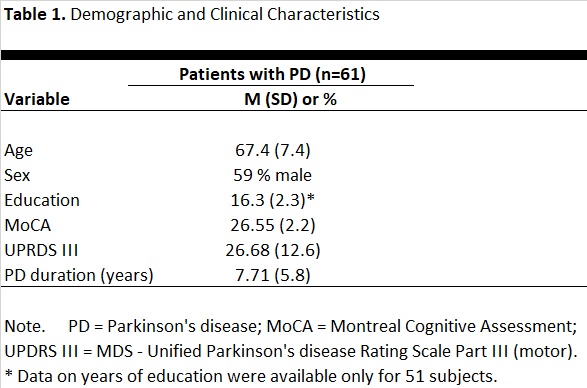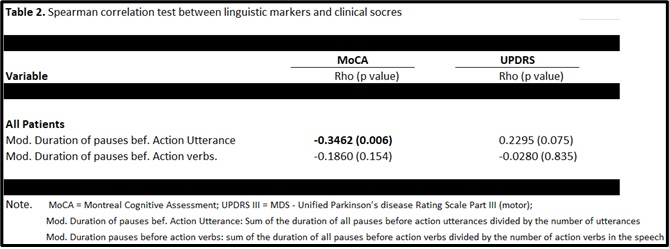Category: Parkinson's Disease: Non-Motor Symptoms
Objective: To characterize action verb production in Parkinson’s disease (PD) during a picture description task, and evaluate associations with motor and cognitive function.
Background: The embodied cognition theory posits that regions of the brain responsible for motor action are also responsible for producing the language related to these actions (action verbs)[1] These regions include left frontostriatal circuits [2], which is substantially affected in PD. Speech production is also impaired in PD, with longer pauses both within [3, 4] and between utterances [5]. Pause locations, however, have not been evaluated in detail. We assessed pauses before action-focused verbs and utterances in a picture description task in PD. We evaluated the association of action-related pauses with motor and cognitive function.
Method: 61 patients with PD [table 1] were asked to describe the cookie theft picture [6]. We manually identified action verbs (AV) and action utterances (AU, utterances containing at least one AV). Pauses were measured using Praat (v5.3.72, www.praat.org). Pauses > 0.5 sec. before AV and > 2 sec. before AU were considered clinically relevant. To control for the amount of speech produced, modified pause variables were calculated. The total duration of pauses before AV and AU were divided by the number of total AV and the total number of utterances, respectively. Spearman’s correlations between linguistic variables and motor severity (MDS-UPDRS Part III) and global cognitive function (MoCA) were calculated. We ran a logistic regression model with the dependent variable cognitive status (MCI or normal cognition, by consensus criteria [7]), and predictors modified AV and AU pauses, controlled for age, sex, and motor score.
Results: Modified AU pauses were inversely correlated to MoCA (rho= -0.311, p=0.016) [table 2] but not significantly correlated with motor score. In logistic regression, there was a significant association of modified AU pauses with cognitive status, after controlling for age, sex, and motor score (OR 63.38, p=0.036).
Conclusion: In PD, pauses before AU in spontaneous speech are more associated with cognitive than motor impairment, suggesting there is difficulty planning sentences related to action. The lack of association with motor severity goes against the embodied cognition theory and suggests that language deficits in PD may be markers of cognitive function.
References: [1]Cardona, J. F., Kargieman, L., Sinay, V., Gershanik, O., Gelormini, C., Amoruso, L., Roca, M., Pineda, D., Trujillo, N., Michon, M., García, A. M., Szenkman, D., Bekinschtein, T., Manes, F., & Ibáñez, A. (2014). How embodied is action language? Neurological evidence from motor diseases. Cognition, 131(2), 311–322. https://doi.org/10.1016/j.cognition.2014.02.001
[2] Rodrigues, I. T., Ferreira, J. J., Coelho, M., Rosa, M. M., & Castro-Caldas, A. (2015). Action verbal fluency in Parkinson ‘s patients. Arquivos de neuro-psiquiatria, 73(6), 520–525.
[3] Whitfield, J. A., & Gravelin, A. C. (2019). Characterizing the distribution of silent intervals in the connected speech of individuals with Parkinson disease. Journal of communication disorders, 78, 18–32.
[4] Huber, J. E., Darling, M., Francis, E. J., & Zhang, D. (2012). Impact of typical aging and Parkinson’s disease on the relationship among breath pausing, syntax, and punctuation. American journal of speech-language pathology, 21(4), 368–379. https://doi.org/10.1044/1058-0360(2012/11-0059)
[5] Ash, S., McMillan, C., Gross, R. G., Cook, P., Gunawardena, D., Morgan, B., Boller, A., Siderowf, A., & Grossman, M. (2012). Impairments of speech fluency in Lewy body spectrum disorder. Brain and language, 120(3), 290–302. https://doi.org/10.1016/j.bandl.2011.09.004
[6] Goodglass, H., Kaplan, E., & Weintraub, S. (2001). BDAE: The Boston Diagnostic Aphasia Examination. Philadelphia, PA: Lippincott Williams & Wilkins.
[7] Cholerton, B. A., Zabetian, C. P., Wan, J. Y., Montine, T. J., Quinn, J. F., Mata, I. F., Chung, K. A., Peterson, A., Espay, A. J., Revilla, F. J., Devoto, J., Watson, G. S., Hu, S. C., Leverenz, J. B., & Edwards, K. L. (2014). Evaluation of mild cognitive impairment subtypes in Parkinson’s disease. Movement disorders: official journal of the Movement Disorder Society, 29(6), 756–764. https://doi.org/10.1002/mds.25875
To cite this abstract in AMA style:
E. Nascimento Andrade, C. Manxhari, K. Smith. Action verb use in PD: A challenge to the embodied cognition hypothesis? [abstract]. Mov Disord. 2022; 37 (suppl 2). https://www.mdsabstracts.org/abstract/action-verb-use-in-pd-a-challenge-to-the-embodied-cognition-hypothesis/. Accessed February 20, 2026.« Back to 2022 International Congress
MDS Abstracts - https://www.mdsabstracts.org/abstract/action-verb-use-in-pd-a-challenge-to-the-embodied-cognition-hypothesis/


